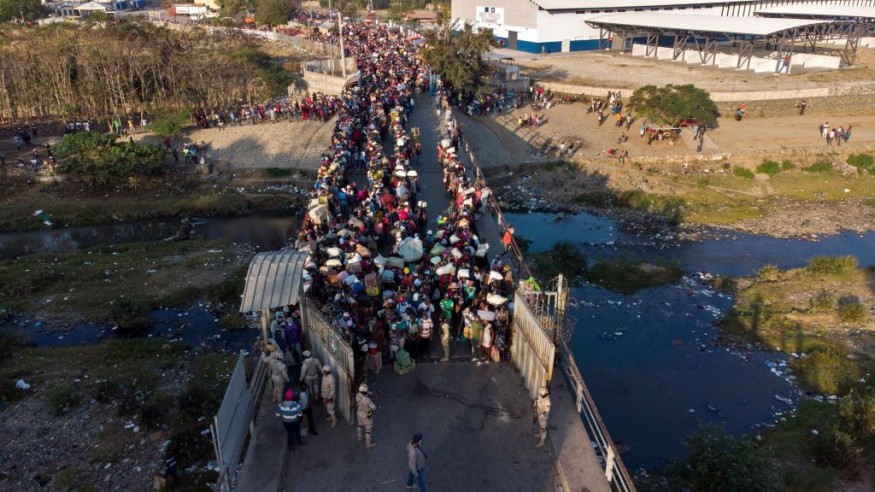Dominican Republic: Why Did President Luis Abinader Threaten To Shut Down Border With Haiti?

Dominican Republic President Luis Abinader announced on Monday the suspension of visa issuance to Haitians and threatened to shut down land, air, and sea traffic between the two neighboring countries amid an ongoing dispute.
The dispute revolves around the recent excavation of a canal in Haiti that Dominican officials argue could divert water from the Massacre River, potentially causing harm to Dominican farmers and the environment, AP reports.
The Massacre River flows through both countries and is named after a historic battle between Spanish and French colonizers in the 1700s.
The origins of the canal's construction in Haiti remain unclear, and it is uncertain whether any official authorization was obtained.
The Dominican government issued a statement, warning that if the conflict is not resolved before Thursday, they will implement a complete border closure to all forms of commerce, including air, sea, and land traffic.
Such a closure would have significant economic repercussions, particularly for Haiti, which heavily relies on imports from the Dominican Republic.
Haiti has been grappling with soaring inflation, deepening poverty, and a surge in gang violence.
The potential border closure would also impact businesses in the Dominican Republic.
READ NEXT : Dominican Republic Explosion
Haiti and the Dominican Republic
A study by the Dominican Republic's Central Bank revealed the substantial volume of informal border trade between the Dominican Republic and Haiti in 2017, amounting to $430 million.
Of this sum, over $330 million represented exports from the Dominican Republic to Haiti.
Haiti also stands as the Dominican Republic's third-largest partner in formal trade, with $1 billion in exports to Haiti reported last year, along with $11 million in imports, according to data from the Export and Investment Center of the Dominican Republic.
Despite ongoing disputes, these trade figures underscore the economic interdependence between the two nations.
In response to the recent canal excavation in Haiti, the Dominican government dispatched a team to monitor the project from across the border.
Officials emphasized that this move was not intended as an act of intimidation but rather as an offer to assist in detaining any individuals working on the project without proper authorization.
The excavation prompted President Abinader to temporarily close the border near the northern town of Dajabon, a vital crossing for Haitians engaged in trade activities.
Tensions between the two countries have been exacerbated by this dispute, with former interim Haitian Prime Minister Claude Joseph defending the canal's construction and accusing critics in the Dominican Republic of nationalism and racism.
President Abinader has implemented measures to restrict Haitian migration into the Dominican Republic in previous years, expelling tens of thousands of Haitians and individuals of Haitian descent.
Additionally, his administration initiated the construction of a 118-mile (190-kilometer) wall early last year along the Haitian border.
Haiti Government Says Criminal Organization Keeps It From Resolving Internal Conflicts
The Dominican Republic has expressed concerns over the canal project in Haiti and its potential implications.
The government has cited the Haitian government's admission of its limited capacity to address internal conflicts, primarily due to the influence of criminal organizations, which has eroded the Haitian state's monopoly on force, according to Reuters.
Accusing the canal project of being driven by Haitian agents to harm their own government and incite conflict with the Dominican Republic, Santo Domingo emphasized its commitment to seeking talks with Haiti to find a "definitive solution."
Notably, this is not the first time the Dominican Republic has closed its border with Haiti. The previous full border closure occurred in July 2021 following the assassination of Haitian President Jovenel Moïse. Since then, parts of the border have been periodically closed for security reasons.
The security situation in Haiti has deteriorated significantly since Moïse's assassination, with armed gangs expanding their control in the country, TVP noted.
Furthermore, a retired Colombian army officer, German Rivera, known as Colonel Mike, recently pleaded guilty in a US court to conspiring and supporting the plot to kill Moïse, adding another layer of complexity to Haiti's ongoing challenges.
This article is owned by Latin Post.
Written by: Bert Hoover
WATCH: Dominican Republic begins construction of border wall with Haiti - From TRT World
Subscribe to Latin Post!
Sign up for our free newsletter for the Latest coverage!
© 2026 Latin Post. All rights reserved. Do not reproduce without permission.













